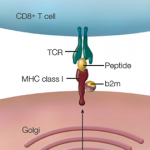Should these findings be confirmed, a potential therapeutic strategy might be to selectively deplete maternal T cells, for example, by targeted specific antibody or by apheresis. However, it is possible that targeting MMc could have adverse consequences because the role of MMc in normal biology is not yet understood and MMc is common in healthy individuals, including within T lymphocytes.12,13
Microchimerism in Neonatal Lupus Syndrome
Findings from research on stem cell biology have led to the intriguing question of whether stem cells (naturally acquired as microchimerism from pregnancy) differentiate into somatic cells. Akin to a good mystery novel in which an unexpected twist appears as the story develops, studies of neonatal lupus syndrome found that MMc can differentiate into cardiac myocytes. Neonatal lupus syndrome is a passively acquired autoimmune disease in the fetus, and maternal autoantibodies are strongly implicated in the pathogenesis. Mothers of infants with neonatal lupus syndrome have antibodies to Ro and La (SSA and SSB) but are often themselves disease-free. The most serious complication of neonatal lupus syndrome is life-threatening inflammation of the atrial–ventricular node leading to congenital heart block.
Female cells were found at autopsy in the heart tissue of boys with neonatal lupus syndrome and heart block, but were rare in age-similar controls who died from other causes. Intriguingly, more than 80% of the maternal cells expressed sarcomeric a-actin, a specific marker for cardiac myocytes.17 This interesting observation raises the question of whether “autoimmunity” sometimes occurs due to loss of tolerance to tissue-specific microchimerism. If so a different therapeutic approach might be considered, directed to restoring or promoting tissue-specific tolerance of chimerism. However, it is not yet known whether MMc is a target for immune reactions or whether MMc traveled to the heart as a secondary event in efforts to restore and regenerate disease-affected tissues.
Analogous to the above studies of MMc, FMc that apparently differentiated into tissue-specific cells has been described in other organs. In a study of seven women with various diseases—including malignancies and autoimmunity—the thyroid, cervix, intestine, and gallbladder had male cells that expressed epithelial cell markers, and a liver biopsy from one woman had male hepatocytes (all women had sons).18 As with studies of MMc, these observations suggest engraftment of multipotent microchimeric stem cells. In another report, male hepatocytes were found in liver biopsies from one-quarter of 28 women with primary biliary cirrhosis and other liver diseases—all of whom had sons.19

